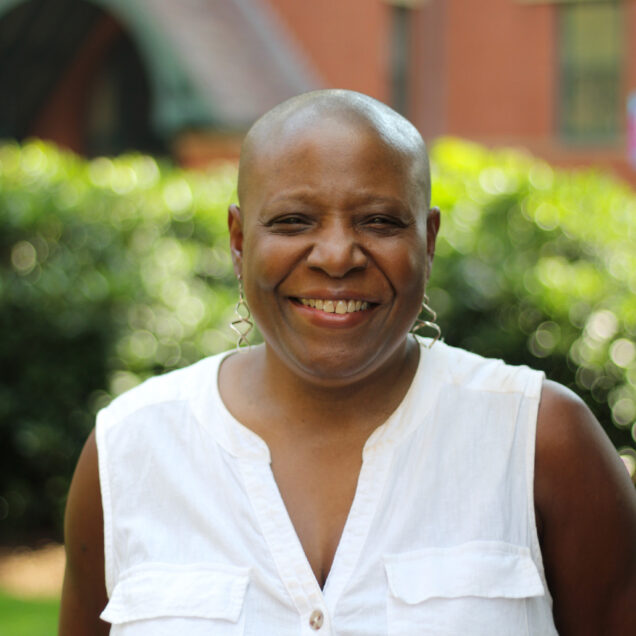Respecting the Importance of a Diversity of Perspectives.

Respecting the Importance of a Diversity of Perspectives
It is important that we continue to create space to hear many sides of the issues with which we engage, writes Yvette Cozier, associate dean for diversity, equity, inclusion & justice.
Yvette Cozier is the associate dean for diversity, equity, inclusion & justice and an associate professor of epidemiology at the School of Public Health.
At SPH, we aspire to place diversity and inclusion at the heart of all we do. In our values statement, we affirm our mission to support “a respectful, collaborative, diverse, and inclusive community within our School of Public Health.” We believe the best way to work towards a healthier world is as a community that supports a diverse range of perspectives, one that welcomes the unique contribution of all who join us.
In our pursuit of this vision, it is helpful to revisit first principles, to refresh our understanding of what diversity and inclusion mean, so we may better support both within our community. What do we mean when we talk about diversity and inclusion? The two words are sometimes used interchangeably, yet they mean different, complementary, things. Simply put: diversity means everyone gets a seat at the table. Inclusion means no one at the table is left out of the conversation. Both are necessary to foster a just, equitable community.
We live our commitment to diversity when we welcome to our school students, faculty, and staff with a diverse range of backgrounds and perspectives. We believe our community is at its best when it is a place where people from all walks of life come together in a shared commitment to the work of public health. Yet it is not enough to simply bring people together. To truly gain the benefit of diversity, we need inclusion. The full flourishing of inclusion means that our community is enriched not just by the presence of people with a diverse range of backgrounds, but by their perspectives, by their unique thoughts and ideas. Engaging with these perspectives makes us better as a community. We learn, we empathize, and we grow towards deeper understanding of the world in which we pursue our work.
More broadly, fostering a diversity of perspectives is central to the mission of a world-class academic institution tasked with generating the ideas that shape a better, healthier world. It helps us to think critically, to see when we are wrong, and to improve at what we do. A university rests on a foundation of free speech and open debate. This foundation is strongest when everyone is included. Indeed, there may be some within our community who hail from a context where an inclusive public debate is not the norm, where social inclusion is determined by identity, class, adherence to a given party line, or other such factor. It is important to learn from the perspective of those who have experienced such places, so we might better appreciate and support inclusivity within our own community.
Maintaining inclusivity in a context of diverse perspectives is not always easy. It takes hearing and discussing ideas with which we may not always agree, or which may even make us uncomfortable. The economist Thomas Sowell once said, “The next time some academics tell you how important diversity is, ask how many Republicans there are in their sociology department.” This is a point worth considering in our efforts to support a diversity of perspectives at SPH. The mission of public health often calls for applying moral clarity to our engagement with issues. This is very much to the good, as we work to be the best possible advocates for the changes to the status quo that support a healthier world. In doing so, it is important that we continue to create space to hear many sides of the issues with which we engage. If we find we are always in agreement, if we never hear from members of our community whose ideas may not align with the prevailing views, then we are not creating a space where all can feel like they can speak up. We are falling short of inclusion.
With this in mind, the office of Diversity, Equity, Inclusion, and Justice is leading on several initiatives and activities in 2022 to support the school’s inclusion efforts. These include developing a syllabus review instrument in collaboration with the Education Department, offering a six-part workshop series for staff, updating the list of SPH vendors to ensure we are partnering with companies that reflect inclusive values, and a series Coffee Chats for faculty, staff, students, and postdoctoral/research associates to foster community and conversation.
These initiatives reflect our ongoing commitment to diversity and inclusion at SPH. Diversity and inclusion strengthen our community and enable the conversations that keep our intellectual life vibrant and engaged with core issues. They are also a necessary condition for the work of public health. For us to shape a healthier world, public health needs to reflect that world. It is not enough to be among the communities we serve, we need to be of them. Public health is at its best when its practitioners—and those with whom we partner—reflect all communities, all socioeconomic backgrounds, races, gender identities, and sexual orientations. Inclusion helps ensure that this diversity informs everything we do, supporting conversations in which all are heard, towards the goal of healthier populations. Thank you to all who work each day at SPH, and within the broader public health community, to foster diversity and inclusion.


Comments & Discussion
Boston University moderates comments to facilitate an informed, substantive, civil conversation. Abusive, profane, self-promotional, misleading, incoherent or off-topic comments will be rejected. Moderators are staffed during regular business hours (EST) and can only accept comments written in English. Statistics or facts must include a citation or a link to the citation.